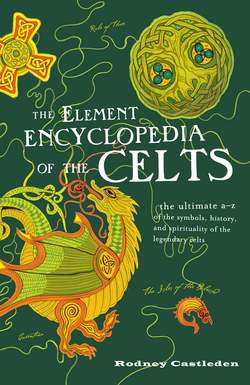Читать книгу The Element Encyclopedia of the Celts - Rodney Castleden - Страница 59
BOUDICCA
ОглавлениеQueen of the Iceni tribe. Boudicca was born in about AD 25 and lived at Thetford in Norfolk at the time of the Roman invasion of Britain. She married Prasutagus in AD 48, when she was about 23 and he was perhaps ten years older. He was King of the Iceni, one of three Celtic tribes to have treaty arrangements with Rome; the others were the Regnenses and the Brigantes. Boudicca gave birth to two daughters: one in AD 49 and one in 50. On the death of Prasutagus, in AD 60, she became regent.
Prasutagus bequeathed half his kingdom to Nero, reserving the rest for his widow and daughters. The Roman governor Suetonius Paulinus was away on campaign in Wales when Prasutagus died, and the procurator, Decianus Catus, decided to swoop in and take the whole of Prasutagus’ estates for Rome. Decianus Catus was ruthless and acquisitive, and his officials were backed by undisciplined troops. The operation was bungled and army discipline broke down. The soldiers raped Boudicca’s daughters, who can only have been 11 or 12 years old, and flogged the queen herself.
The Iceni rose against Rome behind their humiliated queen, joined by their neighbors to the south, the Trinovantes, who had also been roughly handled by greedy legionaries at Camulodunum (Colchester). Together, the Iceni and Trinovantes attacked and burned down the new town. Then Boudicca and her army moved on to sack Verulamium (St. Albans) and London. Paulinus brought 10,000 legionaries back from Wales to confront her somewhere to the north-west of London. At an unidentified location somewhere along Watling Street, Boudicca’s army was slaughtered. The queen herself escaped from the battlefield but died shortly afterward of some illness, perhaps after taking poison; according to Dio Cassius she was given a rich burial. Boudicca’s treasure-laden grave has never been discovered.
Boudicca was famously described in Rome: “She was huge of form and terrifying of aspect and with a harsh voice. A great mass of red hair fell to her knees and she wore a great twisted gold necklace, and a tunic of many colours.”
Dio Cassius makes a point of describing her as invariably wearing a “great twisted golden necklace.” The marvelous gold torc found at Snettisham was made in about 50 BC, which at first sight makes it too early to have belonged to Boudicca. But royal regalia is often several generations old—its antiquity is part of its ceremonial value—and it is possible that this torc, and the rest of the Snettisham hoard, did belong to the queen.
